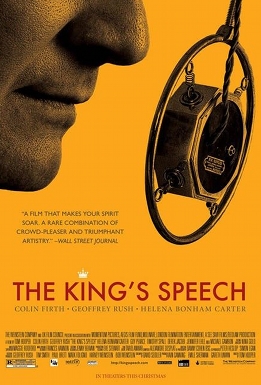When I heard that Tom Hooper's The King's Speech detailed King George VI's long battle with stuttering, I had my doubts as to its overall entertainment value. Nearly two hours later, after witnessing a handful of flawless performances and one powerful montage, I sit flabbergasted at this piece of art crafted for cinema. In short, The King's Speech isn't a movie that deserves to be seen, it simply must be witnessed.
Colin Firth proves that he is a force to be reckoned with, delivering a powerfully moving performance as the speech-frustrated King. His tightly wound emotions and unfailing delivery not only sell him as a leader, but his emotional chemistry with both of his co-stars brings about an unusual feeling of believability for such a period piece.
But Firth isn't alone in his brilliance as both Helena Bonham Carter and Geoffrey Rush deliver impeccable performances as the King's wife and speech teacher respectively. Though they never demand the spotlight, they are integral parts to the overall puzzle that comprises the film's central story. Through their journey we get to see a different side to the King than what would otherwise be shown. They humanize him, bringing about a perception that has us rooting for his success, not silently hoping for a defeat.
Director Tom Hooper does a solid job with his duties as well, meshing together the many qualities required for such a film and blending them to formulate an artistic and unique underdog story. I was amazed at the intensity that was pulled from an otherwise ordinary story; one that shines some light on an often overlooked disorder and shows that when it comes to phobias, no one is immune.

